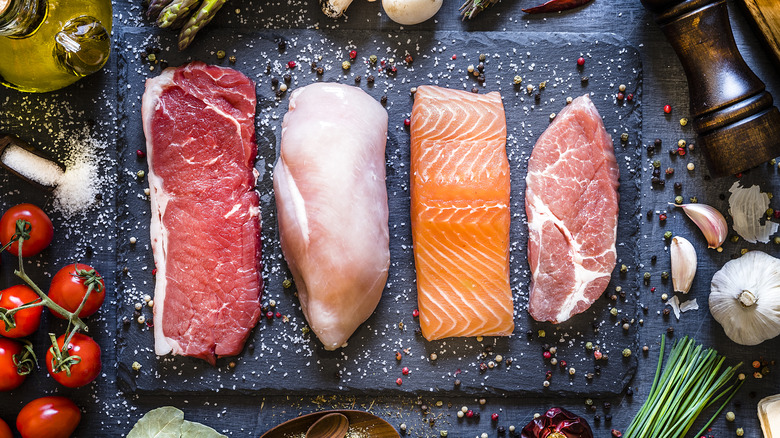How Much Protein To Eat Daily If You Want To Lose Weight
High-protein diet, plant-based diet, low-fat diet, high-fat diet — which do you choose? Although having a proper balance of calories and energy expenditure is key to losing weight in any diet, eating a little more protein can help with weight loss and improve your health. Compared to lower-protein diets, following a high-protein diet while keeping an eye on total calories can lead to more significant weight loss and fat loss while preserving lean muscle mass, according to a 2015 review in The American Journal of Clinical Nutrition. A higher protein diet can also help keep the weight off in the long term because people are more likely to comply with adding more protein to their diets.
Even if reducing the number on the scale isn't your goal, a high-protein diet can also result in lower triglycerides, blood pressure, and waist circumference. More protein can help you control food cravings because you feel more full after consuming protein. How much protein can help with weight loss? The research suggests consuming 1.2 to 1.6 grams of protein per kilogram of body weight per day. This comes to about 25-30 grams of protein for each meal.
Why more protein helps you lose weight
According to the National Association of Sports Medicine, when compared to fat and carbohydrates, protein isn't as easily stored in the body as body fat. In other words, if your excess daily calories come from protein, it takes more effort for your body to process it into fat storage. It shouldn't be a secret that muscle boosts your calorie burn, and more daily protein allows you to keep your lean body mass while you lose weight.
Protein also requires more energy to digest, absorb, and store its nutrients, according to Total Access Medical. When you eat protein, up to 35% of the calories from that protein source are needed to process that food. In other words, if you eat 100 calories of lean chicken, you need up to 35 calories to digest it. On the other hand, eating 100 calories of butter needs less than 5 calories to process the fat.
Protein releases glucagon-like peptide-1 (GLP-1) and other hormones that can reduce your appetite, according to a 2020 article in the Journal of Obesity & Metabolic Syndrome. Protein also decreases the hormone that makes you feel hungry, ghrelin. That leads to you needing less food to make you feel satisfied.
Some issues with too much protein
According to the article in the Journal of Obesity and Metabolic Syndrome, researchers have feared that following a high-protein diet might lead to bone fractures and osteoporosis from the increased levels of acid in the body. High protein diets have also been subject to fears about stressing the kidneys. As a whole, people who have healthy kidneys can safely follow a high-protein diet, but it's not recommended for people with kidney disease. Although there isn't an upper limit for protein intake, research says you can consume up to 1.66 grams of protein per kilogram of body weight without any health issues.
The Mayo Clinic says that high-protein diets might sacrifice fiber-rich foods in order to limit carbohydrates. This might produce side effects such as bad breath, headaches, or constipation. If most of your protein comes from red or processed meat, the saturated fat could put you at risk for heart disease. If you want to add more protein to your diet, be sure to include a variety of protein sources such as fish, low-fat dairy, nuts, and beans.



